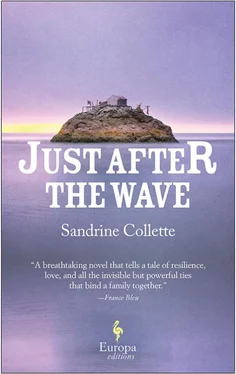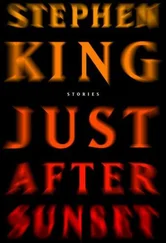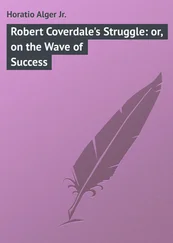At dawn on the fifth day, the hens cluck and rouse them from sleep. They eat a little, pull up the anchor; the day has begun. Louie, Perrine, and Noah take turns rowing, and the worst is when the two younger ones are at it together. Leave it , murmurs Louie, massaging his palms, I’ll row again, we can just stop for fifteen minutes. The day is spent between the meager meals they have to share with the hens and the boat that has to be propelled relentlessly across the water. After lunch, Perrine and Noah fall asleep, from heat and fatigue, and Louie on his own curses the sun, but not too much, just to let it know, because it’s better to burn to a frazzle than to get caught in a storm, which is bound to happen sooner or later. But he complains all the same, because of the sweat stinging his eyes and dripping down his brow, and the feeling he has of being burned all over, suffocating, his throat dry.
Because they’re making no headway, and the days that last forever.
Because of his back and his arms, his belly and his legs, all aching.
Because the younger ones are taking naps.
He shouts. Shit!
Perrine wakes with a start.
“What’s wrong?”
“Nothing. It’s just shit.”
Shortly before nightfall they stop and drop anchor. They eat, drink, feed the hens, gather the eggs they continue to lay, share them out among the birds and themselves, swallowing them whole and trying not to let anything dribble down their chins. Then they lie down; at last, thinks Louie.
Too hot under the blankets—but with these damned mosquitoes.
Fall asleep like the dead.
And every day it’s like this.
How long has it been? They can’t agree, is it five days, or six. Seven, said Noah, but Noah will say anything just so you listen to him. Every morning is the same, with the creaking of the anchor being raised, and the soreness in their muscles that make their movements stiff.
Not seven, no, can’t be.
“If it’s six,” says Noah, “then we’re over halfway there, especially as in the beginning we had the motor and we went fast. We should be there soon, don’t you think?”
Louie shrugs.
“We’re not rowing all that fast. We’re losing some of the time that we made up.”
Noah graciously adjusts his reasoning: Only halfway?
But the thing is, all the days are alike—and basically they ought not to complain, thinks Louie, if something were to change, it would mean bad weather, wind and rain.
“Or land,” adds Perrine.
“No, it can’t be land. Not yet.”
Still…
Suddenly, all three of them give a start. They look at each other without daring to look up again. Perrine has even closed her eyes tight, murmuring, It’s just another mirage, right? So Louie turns to the side where the apparition is coming from. He says to Noah:
“Do you see it?”
“Yes.”
“What about you, Perrine?”
“I think so.”
“Right.”
He scratches his head. This is the first time they have all thought they’d seen the same thing. He asks them again, to be sure:
“An island?”
“That’s right,” says Perrine.
“There it is,” says Noah.
“So maybe we should go take a look, then.”
An hour later, the island has grown larger. They let the boat glide as they hold onto the gunwale, astonished: this time, it’s for real.
“Let’s stop!” exclaims Noah.
“And we can make a fire and cook the fish. We have to catch some,” says Perrine, already looking forward.
They threw away the first fish they caught long ago, since there was no way to cook them; the hens pecked at them with their tip of their beaks, and they tossed the rest into the sea, because of the smell. This time, Perrine and Noah hastily take up their fishing poles, while Louie returns to his oars.
“How long have we got?”
“Gosh, more than an hour. You have time to catch loads!”
Noah laughs, spreading his arms.
“This much?”
“If you can.”
And then.
There are times when nothing goes as it should.
Because, for a start, the fish aren’t biting. No matter how they bait the hooks with bits of raw potato, and cast to the left, to the right, or let the lines trail behind the boat, all they manage to catch after all that is a tiny little mackerel no bigger than a hand. Noah gets annoyed.
“It’s because of the oars, and the noise they make!”
“The other day I was rowing, too, and you caught some,” says Louie. “Am I supposed to stop just so you can fish, is that it?”
They don’t speak for a few minutes. Noah has pulled in his line, and sits with his arms crossed.
“You’re not going to catch any like that,” hisses Louie.
“They’re not biting, anyway. It’s not a good day.”
“But look,” says Perrine, “we’re almost at the island. And… oh!”
“What is it?”
She starts whispering suddenly.
“There must be people there, you can see a hut.”
“Why are you whispering?” asks Noah.
“We don’t know who it is.”
“So?”
“What if they’re people like Ades?”
Noah stiffens. You think so? She doesn’t answer. Louie stops rowing. All three squint into the distance, trying to make out something more precise, something to reassure them, a family waving their arms, a dog playing.
“Do you see any people?”
“No. Just a hut.”
“Maybe there’s no one there.”
“Maybe.”
“What should we do?”
Louie wrinkles his nose: night is falling, they can’t see very well.
“We’ll stop here.”
“Here?” exclaims Perrine.
She spreads her arms, doesn’t need to say any more: to anchor here, only a few hundred yards from the shore, when in fifteen minutes they could have their feet in the sand. Louie shakes his head:
“We don’t know.”
“But what if there’s no one?”
“We don’t know. In any case, we don’t have any fish. We can fish tomorrow morning and when we’ve caught some we’ll go on to the island, okay?”
Not okay. But it’s pointless to say anything.
“You always get to decide,” protests Noah.
“Because you two don’t even know what you’re doing.”
“That’s not true.”
A jab with an elbow, a punch. Perrine raises her hands, Stop it! They turn their backs on each other again, until they think they see some slight movement on the island. All three hurry to kneel by the side of the boat, but darkness is falling over them, hiding the little coast with each minute that goes by. So they lie on the floorboards, gazing at the stars, dreaming about tomorrow, and the feeling of warm sand between their toes, and how when at last they can stretch their legs they will run, and there will be grilled fish, and they picture the fruit they will find—some sort of impossible Eden, the kind you imagine one evening until at daybreak you are disillusioned; every time. Sleep comes late; they’re too tired, and too excited. The hens have been asleep for a long time, their heads tucked beneath their wings.
Very short night. Very faint nudge against Louie’s shoulder. Noah murmurs, Can we start fishing?
“But it’s not light out yet,” murmurs his older brother, eyes half open as he senses the gray dawn; in the distance, strands of yellow cloud mingle with the rays of the rising sun.
“Yes it is, almost. This is the right time to go fishing.”
What does he know, Noah, he’s just saying things. But Louie is too sleepy to protest, and he sits up slowly, at the same time as Perrine, who gives a stretch. The rocking of the boat lulls them, a regular cadence, left, right, left, right. Noah doesn’t feel seasick anymore.
Читать дальше












